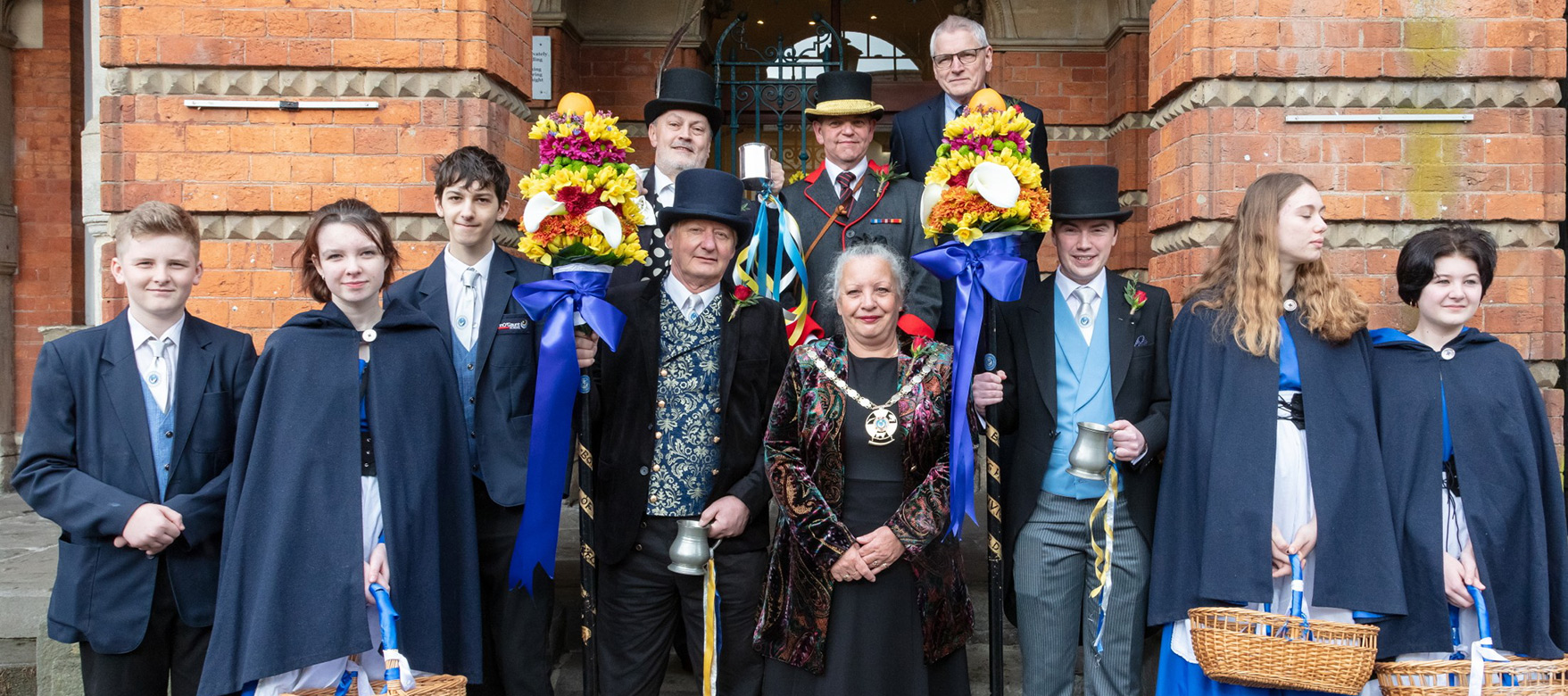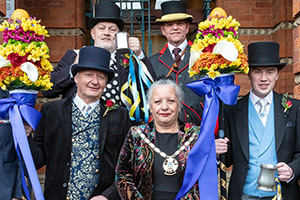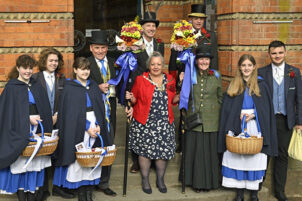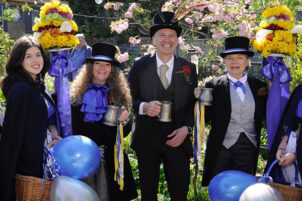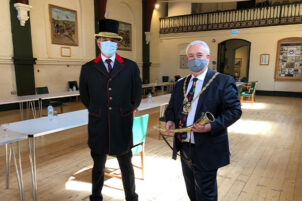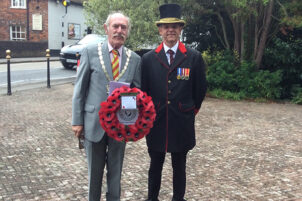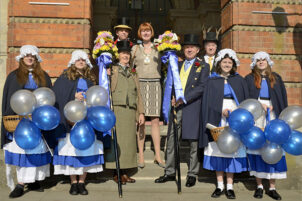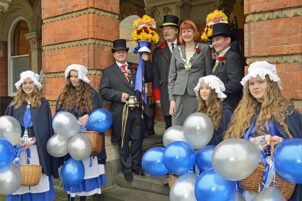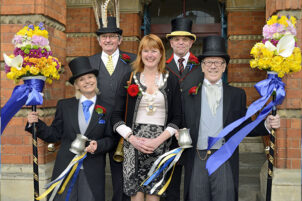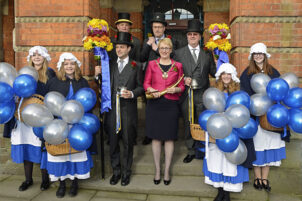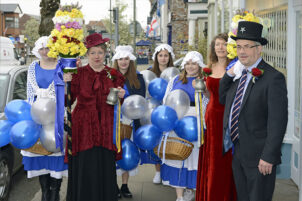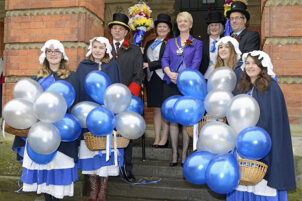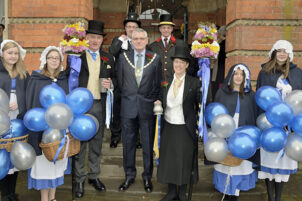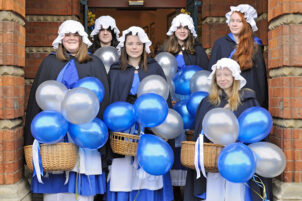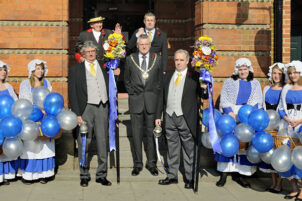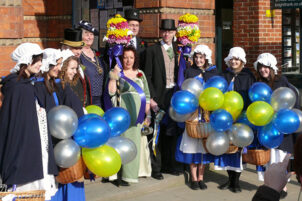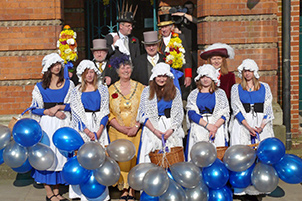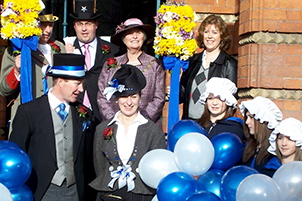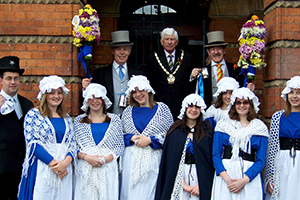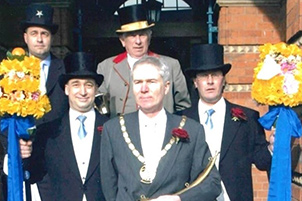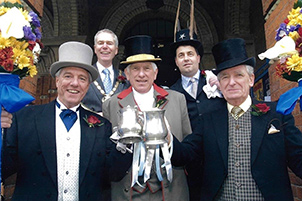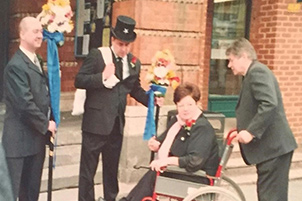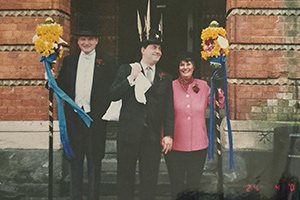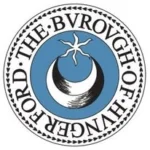Hocktide, Hock tide or Hoke Day is a very old term used to denote the Monday and Tuesday in the second week after Easter.
It was an English medieval festival; both the Tuesday and the preceding Monday were the Hock-days. Together with Whitsuntide and the twelve days of Christmastide, the week following Easter marked the only vacations of the husbandman’s year, during slack times in the cycle of the year when the villein ceased work on his lord’s land and most likely on his own as well.

Celebrated over 2 weeks, the celebrations encompass the selection of the Hocktide Jury, the all-important Ale Tasting, Tutti Day, Hocktide Court and swearing in of the new Officers and Constable for the year at the Court Leet and Court Baron. See below for the annual events.
Annual Hocktide
Events
Tuesday following Easter Monday – Selection of Hocktide Jury
6.00pm All Commoners are invited to jury selection where at least 12 of their number are selected to become the new Hocktide jury for that year. The new Jury is then issued with a summons to attend the Hocktide Court the following Tuesday. Proceedings are held in the Magistrates’ Room and are led by the Steward, and presided over by the Constable.
Second Monday after Easter – Ale Tasting
7.30pm The ‘Assize of Bread and Ale” had 13th century origins. The Assize was where the quality of bread and ale was monitored, an important task as the ale was likely to be safer to drink than the water! The Ale Tasters carry out the task of testing and declaring on the quality of the local ale in front of the assembled crowd of Commoners and their guests.
Second Tuesday after Easter– Tutti Day (Hocktide) – a long action-packed day…
8am – Town Hall Balcony – Summoning of all Commoners to Hocktide Court:
The Bellman will sound the Constable’s horn from the Town Hall balcony. All Commoners are summoned to attend the Hocktide Court by the bell and proclamation.
9am – Town Hall steps – Tutti Men set off
The Constable presents the decorated Tutti Poles to the Tutti (or Tithing) Men/Women who, accompanied by the Orangeman and Tutti Girls, and since 2023 Boys, set off to collect the dues from the Common Right properties. Find out more about the tutti poles and the duties of the Tithing men here. Hocktide and Tutti-Day (hungerfordvirtualmuseum.co.uk)
9.05am – Town Hall – Hocktide Court
The selected Hocktide Jury attend the Court and all Commoners are called. At the head of the Court is the Constable, who takes his or her seat in a carved ebony chair which is probably of Portuguese origin, and possibly dating from the Elizabethan period! The Lucas Horn is laid before the Constable, and the business of the Court commences.
The Hocktide Jury is sworn in, and they select a foreman (using a special traditional procedure). The roll of Commoners is called, and the fines are now paid by a friend so that his right of pasture and fishing is not lost for the following year. In practice, when the name of an absent commoner is called, the Bellman and Assistant Bailiff slams down a penny and shouts “Here Sir!”
The Steward of the Manor then reads the ‘Ancient Customs’, handed down since 1583. The accounts are presented and questions or comments invited. The accounts are then proposed and adopted and signed by the Hocktide Jury.
The Foreman appointed by the Jury then proposes the appointment of the Constable and Officers for the ensuing year, and the Middleman and Endman concur with the proposals.
The Hocktide Rules are then read by the Steward and when he has finished the Constable usually addresses the Court. At the end of Court business the jury are thanked and dismissed, until in receipt of a new Summons.
12.30 – Corn Exchange – Hocktide Luncheon
The traditional highlight of the town’s year, a four-course meal with various toasts and speeches by the Constable and the honoured guest. Grace is said by the Vicar.
Tickets to attend this traditional highlight of the town’s year are available to purchase from Crown Needlework, 115 High Street, Hungerford (01488 684011) by Commoners and townsfolk alike.
Commoners & Trustees Tickets are usually available about 6 weeks in advance.
All other tickets are available on a first-come first-served basis some four weeks before the Hocktide Lunch.
After lunch – Shoeing the Colts
The Blacksmith proceeds with shoeing the Colts, a tradition carried out light-heartedly, in which first-time visitors are caught and ‘shod’ (the horse shoe is real, the shoeing isn’t!)
5.00pm – The Three Swans Hotel – Anchovies on Toast
A traditional and tasty treat, courtesy of The Three Swans.
7.30pm – Corn Exchange
The Hungerford Town Band play for the pleasure of the people of Hungerford.
9.00pm – The Three Swans Hotel – Return of the Tutti Men/Women and the Orangeman. The Three Swans is the last port of call for the Tutti Men/Women. The Constable and collected people of Hungerford welcome them safely back at the end of their long and arduous day and they are then relieved of their duty, handing the Tuttipoles back to their creator to be kept until needed again at Constable’s Sunday Service.
Friday after Hocktide – Town Hall – Court Leet
11.00am The Court Leet (and Court Baron) holds session, where the Office Holders elected at the Hocktide Court are sworn in and the previous year’s incumbents hand over their badges of office to the new office holders.
Sunday after Hocktide – Outside the Town Hall – Constable’s Sunday Service
10.45am The Constable, Commoners, Trustees and various organisations from the town parade from the Town Hall to St Lawrence’s Church, led by the Hungerford Town Band.
11.15am Once at the church, those gathered celebrate the life of the Community of Hungerford.
Once celebrated throughout the country The Town and Manor of Hungerford’s most important event, Hocktide, held on the second Tuesday after Easter and first recorded in the twelfth century was an important holiday and rare day off for the villeins from working the land and allowed them to let their hair down after Lent.
Although there were many regional variations a common theme is the collection of pennies by various means including the waylaying of travellers through the town and demanding a ‘ransom’ with the proceeds going to the parish church. On Hock Monday the men would chase the women, trussing them up and demanding a kiss before they were released. On Hock Tuesday the roles were reversed and by many accounts the woman reaped their revenge with gusto!
But there was also a serious side to Hocktide, the collection of rents by Tithing men, the holding of manorial courts to appoint officers and deal with the administration of the town.
The festivities were eventually banned by Henry VIII, and though reinstated in Elizabethan times were largely forgotten by the end of the seventeenth century, however the tradition persisted in some areas until the ending of the Manorial court system in 1922.
So how come Hungerford alone still celebrates Hocktide and holds its Hocktide Court and Court Leet?
The feoffees of the Town and Manor of Hungerford had governed the town for many hundreds of years until in 1853 the Charitable trusts act threatened their well established form of local government. The trustees of the day dealt with this by ignoring it for 50 years until in 1908, under threat of imprisonment, they negotiated a deal which allowed them to retain all their assets and run the Town and Manor as a registered charity for the benefit of the inhabitants and a separate parish council was created.
One of the most important responsibilities that the trustees were charged with was protecting the ancient traditions of the town and the rights of the commoners and so our most important event which was the holding of a Hocktide Court and the festivities that went with it persisted, however, 1922 finally saw the abolishment of the manorial court system. The trustees argued that they would not be able to discharge their duties under the Charitable scheme if they were not allowed to hold the Hocktide Court and Court Leet and to appoint the various officers and that is why The Administration of Justice Act of 1977 contains a very short list of Towns and organisations still permitted to retain the Manorial court system in some form and why Hungerford is now the only place in the country where these traditions are still upheld.

